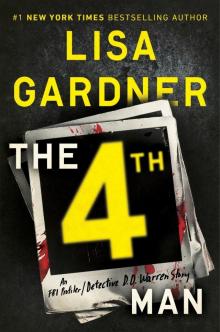- Home
- Lisa Gardner
The Other Daughter Page 7
The Other Daughter Read online
Page 7
“What the hell are you doing in my living room?”
“My job. What the hell are you doing sleeping here?”
“None of your business!” Melanie blinked owlishly. It was bright. Too bright. And noisy too. Screeching cars, shouting pedestrians, honking horns. She suddenly had a bad feeling.
“What time is it?”
“One-thirty.”
“Oh, my God.” Melanie never slept past eight. Never. And now it was all coming back to her. The scene with Larry Digger, David Reese carrying her home, the bad dream, the long night in front of Meagan Stokes's portrait. And now David Reese again, still smelling like Old Spice and rattling her nerves.
He'd traded in his white waiter's tux for an old Red Sox T-shirt and jeans. In daylight she saw that he had brown hair with hints of red. Deep brown eyes with hints of green. A face closer to forty than thirty, weatherbeaten and hawkish. Intense, she thought immediately.
He took a couple of steps away from her, and she noticed a limp. He winced but covered up by pressing his lips into a thin line.
“I take it you're here for work,” she said finally.
“We're dismantling the juice carts. It's a laugh a minute.”
“I'm sure it is. Now, is there something in particular that dragged you out into the living room?”
“Tools. Harry was in charge and all he brought was a ball peen hammer. Not too bright, Harry.”
She said briskly, “The tool kit is in the utility closet in the kitchen. Go look there.”
David merely stuck his hands in his back pockets. “We searched the kitchen area already. No tool kit. Nice collection of lightbulbs though.”
“Oh.” She frowned. “Well, my father might have taken it out for something. Go ask him.”
“Can't. Dr. Stokes left first thing this morning.”
“What about María?”
“That the maid? Haven't seen her.”
“Well, maybe my mother knows what my father did with it.”
“Mrs. Stokes is gone too. She didn't want to be late for her spa.”
“Oh, I forgot.” Sunday was AA day. Her mother wouldn't be home until at least five. Which meant it really was up to Melanie to find the missing tool kit.
She rose to her feet, but David didn't seem to be in the mood to move. In fact, he appeared to have something on his mind.
She looked at him curiously.
He asked abruptly, “How are you?”
“Fine.”
“Spending the night on the couch?”
“It's a very comfortable sofa.”
“With a clear view of Meagan's portrait?”
“I came for the sofa, not the view.”
“Uh-huh,” he said. “Just because a man showed up last night and alleged that the murderer of Meagan Stokes was really your father. That your adoptive parents aren't as good or kind as you believe—”
“Oh, my God, you heard everything!” She had thought he'd arrived only toward the end. She hadn't realized . . . He'd never said . . .
She jabbed a finger at his chest. “How dare you! You stood there and eavesdropped on my life. What the hell did you think you were doing?”
“Checking to see if you were all right—”
“Dammit, why did you follow me last night?”
David shook his head, his voice ringing with disdain. “You walked out the door in the middle of your own party with some suspicious man administering a death grip to your arm, and you have to ask why I followed? Chrissakes, you looked like you were setting yourself up to get killed!”
“I can take care of myself.”
“Lady, go tell that to my shoes.”
Melanie flushed. Shit, she had thrown up on him. It was hard to argue with that. Before she could summon some smart retort anyway, just for pride's sake, he said, “I got a job to do. When you find the tools, yell for Harry.”
“Fine.”
“Fine.”
He headed down the hall and Melanie thought good riddance. It was late. She needed to get on with her day. Then a fresh thought struck her and made her call him back. “Wait!”
Halfway down the hall, David halted grudgingly, giving her an impatient stare.
“Since . . . since you did hear everything . . .”
“Uh-huh.”
“What . . . what did you think of Larry Digger?”
“I think he's probably a drunk,” David said matter-of-factly.
She breathed easier. Yes, this was the opinion she wanted—assurances that Larry Digger was full of shit. “It's a preposterous story.”
“Lot of holes, like you said.”
“Really.” She waved her hand dismissively. “No parents in their right mind would give the child of their daughter's murderer a home. That's outrageous.”
David nodded again, but now his gaze was hooded and hard to read.
“He's probably just after money,” she said. “Thank you, Mr. Reese. I'll get those tools to you shortly.”
“There was one interesting thing he did bring up,” David said.
Melanie paled. “What?”
“Why now? If it's all about money, why didn't Larry Digger approach you or your parents years ago?”
Melanie suddenly had a chill. She rubbed her arms to chase it away. “It could have taken him a long time to come up with a story. Or maybe he didn't need money before.”
“The phone call's interesting too. Why say that he'd traced the tip to your house? Why add that particular detail?”
Melanie couldn't answer. Would Larry Digger really try to be exact if he simply wanted money? Cons could be elaborate. But why now? Not earlier, when she would have been more vulnerable, more interested in the past.
She was still churning the questions over in her mind when David said, “I could help you with this.”
“Pardon?”
“I used to be a policeman, all right? I got arthritis. Took me off the force, but I still have contacts. If you want, I could check out Larry Digger.”
The limp, the twinges of pain he tried to hide, must be from the arthritis. And his having been a cop would explain why he had followed her last night. Everything about Larry Digger would have triggered his instincts. So he had followed and looked out for her.
Melanie found herself warming toward David Reese. But then she shook her head. “It's okay, I can take care of it.”
“With all due respect, what do you know about a man like Larry Digger?”
“Well, for starters, I know I can check his story about the anonymous tip by looking through our phone bills.”
David narrowed his eyes. “What about a full back-ground search?”
“I'll call his employer. Newspapers in Texas.”
“Know how many newspapers there are in Texas?”
Melanie smiled at him sweetly. “Then I'd better get right on it, shouldn't I?”
“Don't give an inch, huh? Don't ever ask for help?”
“Welcome to the Stokeses, Mr. Reese. We take care of our own.”
“Yeah?” David gave her a hard stare. “Then why, when some tired old reporter was dragging you out of your own home, was a waiter the only one who noticed? What do you think of that, Miss Stokes?”
Melanie didn't have an answer.
Two cups of coffee later, alone in the dining room, Melanie watched the afternoon sun sift through lace curtains as she picked at a blueberry muffin.
“Maybe you had to see them in Texas with their two kids, one so sweet, everyone loved her, and one already so troubled, half the moms on the block wouldn't let him play with their children. I'm getting the impression, Miss Holmes, there's a helluva lot about your family you just plain don't know.”
Why didn't she know more about Meagan Stokes or her family's life in Texas? In spite of her bold words to both Larry Digger and David Reese, that fact was beginning to trouble Melanie.
She'd always assumed that the subject of Meagan was too painful for her parents to discuss. Also, it was probably not a topic
of conversation they wanted to share with their adopted daughter. In spite of what people liked to say, families with adopted children had different dynamics. The beginning was not natural or smooth, but held a closer analogy to dating—everyone wore their nicest clothes, practiced their best manners, and tried not to do anything that would make them look too foolish. Then came the honeymoon phase, when parent and child could do no wrong, since everyone was just so gosh darn happy to have one another. Then, if the adoption was successful, the family finally eased into the fifty-years-of-marriage stage. Comfortable, well-adapted, knowing each family member's strengths and weaknesses, and loving them anyway.
Melanie liked to think her family had achieved that final stage of familial nirvana, but now she had to wonder. If they were so comfortable with one another, why hadn't they ever spoken of Meagan? Why hadn't Melanie asked? Even if it had been painful once, it had been twenty years ago. Surely after two decades . . .
It's the past, she told herself firmly. It shouldn't matter.
But now she was no longer certain. Larry Digger's insinuations were taking root. The reporter was starting to win.
Melanie gave up on the muffin. She crossed the hall into her father's study, where she was immediately greeted by the sight of books piled everywhere. On the cherry-wood desk, on the red leather swivel chair, and on the floor.
Apparently, while she'd been out dealing with Larry Digger, the literacy ball had turned into quite a success. She should catalogue the books that afternoon, prepare them for inventory by the rare-book dealer on Boylston Street. There was a lot of work to get done.
Melanie opened up the mahogany file cabinet and looked for a file marked Nynex. The good news was that her predictably anal father did keep the phone records each month. The bad news was that they had not yet received the new bill covering three weeks ago. Tomorrow she would call and request an early copy of the bill.
That would take care of Larry Digger.
But what about her own past? Why hadn't her parents pressed to find out more? In the beginning they had probably been scared. If they found her real parents, those parents could potentially take her away from them. But it had been twenty years and they had never once asked her if she had remembered anything. They had never even asked her if she wanted to pursue things further. What about hypnosis or regression therapy or things like that? Surely her father, as a doctor, had thought about it.
But nothing was ever said, and Melanie was left with the uncomfortable thought that for all the closeness in her family, there was a strange, unspoken rule. Don't push too hard, don't say too much. Don't look back.
“I'm getting the impression, Miss Holmes, there's a helluva lot about your family you just plain don't know.”
And if you told them the same, she thought bluntly, what would they say? She was no better, she liked her privacy too. She'd never told her family the details of what went on with William. She'd never talked about the perfect first date, when he'd taken her walking along the Charles and they had discussed greedily, almost feverishly, what it was like to grow up knowing you'd been abandoned by your birth parents. She'd never talked about the weekend three months later, the perfect weekend when they had made love until four in the morning. Later, getting dressed, her body all languid and flushed from sex, Melanie had spotted the lace bra stuffed beneath the mattress, the bra that wasn't her own. She'd gone home knowing her engagement would have to end but never mentioning a word of it to her parents. When the deed was finally done, she'd simply told them it hadn't worked out. No more, no less. Her parents seemed to understand, though she could tell her father was hurt. William had been his idea, after all.
No one spoke of it again, and Melanie liked it that way.
She had her past, her parents had their past. The more she thought of it, the less she found it sinister and the more she considered it basic human nature. Little secrets, little moments of privacy. That was all. Just because people needed their space didn't mean they'd conspired to adopt the daughter of a killer. That was absurd.
Larry Digger was absurd.
Tomorrow she'd get the phone bill. It would reveal no calls to Texas. Then they could all get on with their lives.
And the voids? The little girl's voice and cries to go home?
Melanie didn't have an easy answer for that one. She was twenty-nine years old. She liked her work, enjoyed her community, loved her family. Did she really care about where she came from anymore?
Was there ever a point in your life when you didn't?
Melanie sighed. She wasn't going to get much done in her current state of mind. What she needed was a good jog.
She went upstairs, her footsteps slowing as she saw her bedroom door. It was ajar; she could see the reflection of tiny flickering lights on the wood panel. Then the smell hit her. Gardenias, thick and cloying.
Melanie didn't own anything that smelled like gardenias.
Something . . . something was beginning to stir again. Shadows shifting in her mind. Ripples in the void.
She pushed open her door. Her bed came into view. She'd left it rumpled in the middle of the night. Now the yellow sheets were drawn up, the handmade blue and purple quilt perfectly smooth. Melanie's bed was never made.
“María?” she whispered.
No answer.
Her gaze fell to the foot of her bed.
And all of a sudden the images exploded.
Little girl holding the red wooden pony. Little girl on the floor of the crude wood cabin, clutching her favorite toy to her chest.
“I want to go home,” she whimpered.
“Give me the toy, sweetheart. If you give me the toy . . .”
“I want to go home.”
“Meagan, stop pouting.”
“P-p-please?”
“GIVE ME THE PONY.”
“I want to go home, I want to go home, I want to go HOME. No. No, no. NOOOOO!!!!”
Melanie ran into the hall. She was crying, falling to her knees, pressing her forehead against the floor, trying to get the images to go away. She didn't want to know. She didn't want to see.
Then she inhaled the scent of gardenias again, and the pictures resumed rolling.
Vaguely she heard footsteps pounding up the stairs.
“Hello? I thought I heard a cry . . . Melanie!”
She couldn't get her head up. She couldn't tell David Reese to stay away. It wasn't his business. No one's business but hers.
She lay there with her head pressed against the floor and distorted pictures flashed like lightbulbs in her mind.
Meagan, pony, cabin. Meagan, pony, cabin.
Who is in the doorway? Who is standing in the doorway?
What am I doing here?
I don't want to know, I don't want to know . . .
“Oh, God,” David said.
Melanie looked up. He was staring into her room with an expression on his face she couldn't read. Maybe it was shock. Maybe it was pity.
She had to turn away, and then she whispered, “Don't let my parents see. My brother . . . my brother will know what to do.”
She closed her eyes again.
Who is in the doorway? Who is standing in the doorway?
I don't want to know . . .
SEVEN
B RIAN STOKES HAD always known he was destined for a difficult life. From earliest memory, his moods had been cynical and bleak. His childhood was defined by endless gray nights, his father always working at the hospital while his mother sat stiffly on the sofa, regal in her loneliness. Sometimes Brian would play little games, cuddling up to his mother, giving her his most charming grin until she would finally smile and pull him into her sweet-smelling embrace. Other nights he was cruel, smashing vases and furniture, running screaming through the house until his mother would break down into tears, sobbing and crying and begging to know why he hated her so much.
At the age of six he didn't have an answer. He didn't know why he made his mother laugh or why he made his mother cry. He
was mostly aware of a sense of guilt and insecurity. That something in the household just wasn't right. They would all hate him in the end, he thought. His father, his mother, his baby sister, Meagan . . .
Probably the only person he'd been good to in his life was Melanie, and lately he'd been mean even to her. He'd ignored her phone calls and other overtures. He'd removed himself to his South Boston condo, where he could hone his self-loathing to a razor-sharp edge.
Three months ago he'd lain in bed, wondering why he didn't just slit his wrists, then had thought of Meagan. Precious, beautiful Meagan. The way she used to hold out her arms and beg for piggybacks. The nights he used to run to her room just to watch her sleep, to keep her safe though he hadn't known from what. Not until it was too late.
Meagan, Meagan, I am so sorry.
He'd gotten out a box of razors.
And then he'd thought of Melanie. The way she'd looked the first time he'd seen her, the way she'd thrown her arms around him, the way she had loved him, simply loved him.
Melanie had brought life back into the Stokes family, and Brian could not fail her. If he didn't want to live for himself, then he would have to live for her.
He'd joined a support group. He was learning that he carried too much rage. He was learning that he had “conflicted” views of his family and “issues with real intimacy.” He was learning he needed to figure out once and for all who he wanted to be. Not what his father wanted, not what his family wanted, but what he wanted.
Brian Stokes needed to learn to love himself. And he was realizing more and more that had less to do with his confusion about being a homosexual and more to do with his guilt over his baby sister's death. Twenty-five years later all those days in Texas were suddenly haunting him with a vengeance. Some nights he'd wake up in a cold sweat. Other times he'd wake up screaming.
Then there was the night Brian dreamed his own parents' death, and it made him happy. These days he did not trust himself to go home.
Then this morning, Jamie O'Donnell had called. Melanie was looking too pale, too worn around the edges, Jamie said flatly. She'd had a migraine last night and she had migraines only under extreme stress. Did Brian know what the hell was going on?

 Find Her
Find Her Before She Disappeared
Before She Disappeared One Step Too Far
One Step Too Far When You See Me
When You See Me Never Tell
Never Tell Touch & Go
Touch & Go The Survivors Club
The Survivors Club MacNamara's Woman
MacNamara's Woman Love You More: A Novel
Love You More: A Novel Gone
Gone The Perfect Husband
The Perfect Husband Maggie's Man: A Family Secrets
Maggie's Man: A Family Secrets The 7th Month
The 7th Month The Neighbor
The Neighbor Hide
Hide 3 Truths and a Lie
3 Truths and a Lie Catch Me
Catch Me Fear Nothing: A Detective
Fear Nothing: A Detective Right Behind You
Right Behind You The Guy Who Died Twice
The Guy Who Died Twice Live to Tell: A Detective D.D. Warren Novel
Live to Tell: A Detective D.D. Warren Novel Live to Tell
Live to Tell Maggie's Man: A Family Secrets Novel
Maggie's Man: A Family Secrets Novel The Other Daughter
The Other Daughter Alone
Alone Crash & Burn
Crash & Burn The Detective D. D. Warren Series 5-Book Bundle
The Detective D. D. Warren Series 5-Book Bundle Look for Me
Look for Me Love You More
Love You More The FBI Profiler Series 6-Book Bundle
The FBI Profiler Series 6-Book Bundle The Third Victim (Quincy / Rainie)
The Third Victim (Quincy / Rainie) Say Goodbye
Say Goodbye The 4th Man
The 4th Man 3 Truths and a Lie: A Detective D. D. Warren Story (Kindle Single)
3 Truths and a Lie: A Detective D. D. Warren Story (Kindle Single) Brandon's Bride
Brandon's Bride